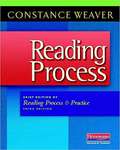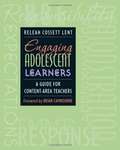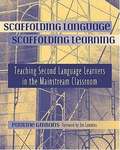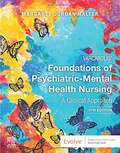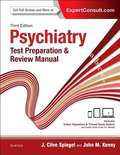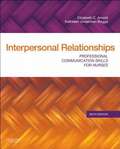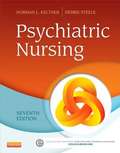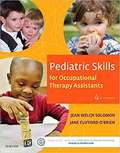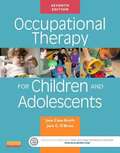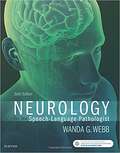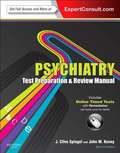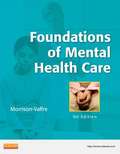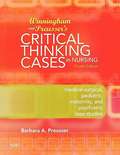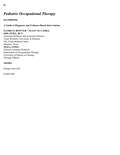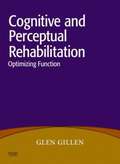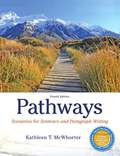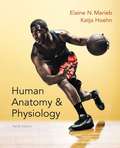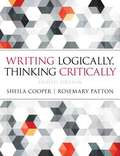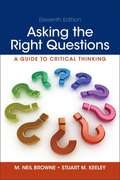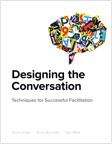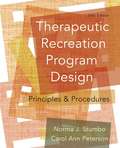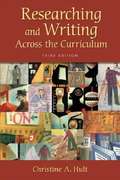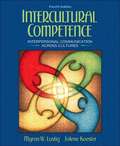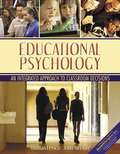- Table View
- List View
Essential Linguistics: What Teachers Need To Know To Teach ESL, Reading, Spelling, And Grammar
by Yvonne S. Freeman David E. FreemanThe authors make the Second Edition more valuable by clearly explaining English phonology, morphology, and syntax and the implications for teaching, using the International Phonetic Alphabet to prepare students for the Praxis examination, including chapters on first and second language acquisition research and theories, reviewing ESL teaching methods. With examples, activities, and end-of-chapter applications that link linguistic theory and classroom practice, the authors show teachers how to use their new understandings of linguistics to help student learning.
Reading Process: Brief Edition Of Reading Process And Practice
by Constance WeaverThe Brief Edition of Constance Weaver's classic Reading Process & Practice begins with the seemingly simple question "What is reading, anyway? What is the essence of the reading process itself?" With so many competing, often antithetical interpretations, teachers need an answer they can trust and put to use. Connie Weaver knows the research and her book is designed to help teachers develop their own research-based definition of reading. <p><p> Written in clear, concise language, Reading Process, Brief Edition, is still comprehensive. It takes the chapters from the third edition of Reading Process & Practice that explore the reading process, miscue analysis, and supporting struggling readers, combining them with features ideal for preservice, post-graduate, and in-service learning. <p> To answer "What is reading?" we must examine how readers interact with texts in normal settings. To learn what this research says, we can trust Connie Weaver and Reading Process, Brief Edition. It remains the essential guide for teachers who want an understanding of reading around which they can build effective practices.
Engaging Adolescent Learners: A Guide for Content-area Teachers
by Releah Cossett LentExamine what it means to engage young adults in their learning and find out what classrooms with engaged students look, sound, and feel like. Let Releah Lent help you transform your classrooms into places where students have the freedom to satisfy their natural inclination to explore. With Engaging Adolescent Learners at your side, you'll have everything you need to help even the most reluctant students find a way to learn that works for them.
Scaffolding Language, Scaffolding Learning: Teaching Second Language Learners in the Mainstream Classroom
by Jim Cummins Pauline GibbonsHow does a mainstream elementary classroom teacher with little or no specialized ESL training meet the challenge of teaching linguistically diverse students? Pauline Gibbons suggests how: integrate the teaching of English with the content areas of the regular curriculum. What's more, she shows how in this practical resource book. Gibbons begins with a strong theoretical underpinning for her practice, drawing on a functional model of language, sociocultural theories of learning, and current research on second-language development. After supporting her view that the regular curriculum offers the best language-learning environment for young ESL students, Gibbons demonstrates the ways in which content areas provide a context for the teaching of English, from speaking and listening to reading and writing. These in turn are treated not as discrete skills, but as ones that can also be integrated in the learning of diverse subjects. Gibbons illustrates this with a wide range of teaching and learning activities across the curriculum, supplemented with programming and assessment formats and checklists. Language learning is not a simple linear process, but involves the ongoing development of skills for a range of purposes. Gibbons sees this development as largely the result of the social contexts and interactions in which learning occurs. By focusing on the ways in which teachers can "scaffold" language and learning in the content areas, she takes a holistic approach-one that appreciates the struggle of students learning a new language, while simultaneously developing subject knowledge in it, and the challenge for teachers to address these needs. Given today's culturally and linguistically diverse classrooms, ESL students can no longer be thought of as a group apart from the mainstream-they are. the mainstream. This book describes the ways to ensure that ESL learners become full members of the school community with the language and content skills they need for success.
Varcarolis' Foundations of Psychiatric-Mental Health Nursing: A Clinical Approach
by Margaret Jordan HalterPrepare for psychiatric nursing care with this comprehensive, evidence-based text! Varcarolis' Foundations of Psychiatric-Mental Health Nursing: A Clinical Approach, 9th Edition makes it easy to understand the complexities of psychiatric disorders and how to provide quality mental and behavioral health care. Clinical chapters follow the nursing process framework and progress from theory to application, preparing you for practice with real-world examples. Other notable features include illustrated explanations of the neurobiology of disorders, DSM-5 criteria for major disorders, and nursing care plans. From clinical nurse specialist and lead author Dr. Margaret Jordan Halter, this bestselling text includes new Next Generation NCLEX® content to prepare you for success on your PMHN certification exam.
Psychiatry Test Preparation And Review Manual
by J. Clive Spiegel John M. KennyCovering every area of the ABPN board exam, the 3rd Edition of Psychiatry Test Preparation and Review Manual, by Drs. J. Clive Spiegel and John M. Kenny, includes 1,100 questions, video vignettes, and an online timed assessment to prepare you for certification or recertification success. You'll know exactly what to expect when exam day arrives, thanks to current coverage of the latest research in both psychiatry and neurology, as well as a format that precisely mimics all aspects of the written exam. Features six tests of 150 multiple-choice questions each, as well as 160 multiple-choice questions related to case vignettes. Allows you to see results broken down by topic online, so you can target areas needing further study. Bookmarking and score archiving are also available online. Allows you to exclude topics which are not included on the MOC, such as neuroscience and neurology, so you can more narrowly focus your study. Gives clear explanations for both insufficient/incorrect and correct answers, and provides recommended readings from key textbooks. Reflects the latest research and clinical practice in both psychiatry and neurology.
Interpersonal Relationships: Professional Communication Skills for Nurses
by Kathleen Underman Boggs Elizabeth C. ArnoldAcclaimed for its strong theoretical framework and consistent organization, Arnold and Boggs' Interpersonal Relationships: Professional Communication Skills for Nurses, 6th Edition, remains the definitive resource in developing effective communication with clients, families, and colleagues in order to achieve treatment goals in health care. This two-time AJN Book of the Year award-winner is thoroughly updated and includes current references describing how to modify communications strategies for various populations and situations including children, the elderly, end of life, health teaching, stress, crisis, and colleagues. Two new chapters address issues in contemporary health care related to promoting health safety and supporting continuity of care. Not only does this book present proven communications strategies and principles in nursing, psychology, and related theoretical frameworks, but also it challenges you to apply these strategies and principles to numerous exercises and practical nursing case studies. Written in terms of the nurse-client relationship, the cutting-edge communications strategies presented are key for nursing students and professional nurses. Covers all mandated topics for nursing professionals, from beginning students to staff development in a variety of settings, including professional collaboration, health team communication, patient-centered care, safety, and hand-off communication. Discusses nursing, behavioral, developmental, family, and communication theories, providing an essential foundation and a theoretical perspective of effective communication. Offers basic concepts first, followed by applications with emphasis on assessment, providing a sound framework as you prepare for nurse-client interactions. Experiential exercises offer the opportunity to practice, observe and critically evaluate your professional communication skills in a safe learning environment. Critical Thinking Exercises promote critical thinking processes essential for effective communication in nursing practice. Includes case examples throughout, creating empathy for clients' perspectives and needs. Offers Ethical Dilemma and Developing an Evidence-Based Practice boxes in each chapter. Describes how best to use the electronic health record for clear communication with current information on classification systems, standards of documentation, and telehealth technologies used in nursing. Acknowledges humor, gender, and touch as important means of communication in interpersonal relationships. Increases awareness of the issues involved in communicating with individuals of various stages of life, clients with special needs, and colleagues in all areas of health care. Provides learning objectives, chapter overviews, and a detailed glossary -- all designed to focus your learning and help you organize key content. A timely NEW Communicating for a Safe Environment chapter provides practice guidelines in line with The Joint Commission National Patient Safety Goals on improved communication among caregivers. NEW Communicating for Continuity of Care chapter defines COC and describes current challenges, and addresses its relational, informational, and management dimensions. Enhanced discussion on spirituality and end-of-life needs focuses on trust, empathy, and the nurse-client relationship -- all central components of holistic nursing identified by The Joint Commission as priorities for patient care.
Psychiatric Nursing (Seventh Edition)
by Norman L. Keltner Debbie Steele<P>Learn the therapeutic skills you need to succeed in the nurse’s role in psychiatric care!<P> Psychiatric Nursing, 7th Edition uses a practical approach to psychotherapeutic management that clearly explains how to manage and treat individuals with psychiatric disorders.<P> It emphasizes the nurse’s three primary tools: you and your relationship with patients, medications, and the environment. <P>This edition adds a new chapter on forensics along with coverage of the latest trends and treatments.<P> Written by educators Norman Keltner and Debbie Steele, this text provides a solid, real-world foundation for the practice of safe and effective psychiatric nursing care.
Pediatric Skills for Occupational Therapy Assistants
by Jane Clifford O'Brien Jean W. SolomonLearn to provide effective therapy for children and adolescents with Pediatric Skills for Occupational Therapy Assistants, 4th Edition. This market-leading text offers a comprehensive, application-focused guide to pediatric occupational therapy assisting by incorporating the AOTA Practice Framework. The text’s focused and easy-to-use approach to pediatrics covers everything from the scope of practice to in-depth coverage of normal development, pediatric health conditions, and treatment planning. This new edition has also been thoroughly updated and expanded to include new content and chapters on community systems, physical agent modalities, the Model of Human Occupation assessments, childhood obesity, documentation, neurodevelopmental treatment, and concepts of elongation.
Occupational Therapy For Children And Adolescents
by Jane Case-Smith Jane O'BrienThe sixth edition of Occupational Therapy for Children maintains its focus on children from infancy to adolescence and gives comprehensive coverage of both conditions and treatment techniques in all settings. Inside you'll discover new author contributions, new research and theories, new techniques, and current trends to keep you in step with the changes in pediatric OT practice. This edition provides an even stronger focus on evidence-based practice with the addition of key research notes and explanations of the evidentiary basis for specific interventions.
Neurology for the Speech-Language Pathologist (Sixth Edition)
by Wanda G. WebbThe concise, easy-to-understand Neurology for the Speech-Language Pathologist, 6th Edition provides students and clinicians with a practical guide for the study and understanding of neurology in speech-language pathology (SLP). Correlated with clinical syndromes and diseases seen in SLP, it gives you a solid understanding of the nervous system, including: development of the nervous system, organization of the brain, protective mechanisms, descending motor and ascending sensory pathways, and cranial nerves. New content, case studies, and a strong clinical focus make this new edition essential as you move into practice.
Psychiatry Test Preparation and Review Manual (Second Edition)
by J. Clive Spiegel John M. KennyUpdated to reflect all of the latest research in psychology and neurology, Psychiatry Test Preparation and Review Manual, 2nd Edition precisely mirrors the written ABPN board exam so you can expertly prepare and achieve your highest score. This psychiatry Q book now features over one thousand questions including an online component with all MCQs from the text, ensuring you know exactly what to expect when exam day arrives. Enhance your preparation with recommended readings from key textbooks in the field. Understand why your answers are correct or incorrect through detailed explanations of each possible response. Study as effectively as possible with 300 brand-new questions that match the current exam format, as well as 160 clinical vignette questions that are stylistically based on those appearing on the ABPN board exam and other standardized tests. Experience a realistic exam simulation online at www. expertconsult. com, where you can take timed assessment tests as well as untimed practice tests, target specific areas of weakness, exclude topics not included on the MOC exam (such as child psychiatry and neurology), and more!
Foundations of Mental Health Care
by Michelle Morrison-ValfreIncrease your awareness and understanding of a holistic view of mental health care with this book for nurses and other health care professionals. Each chapter covers a specific psychological or psychosocial problem as well as the most current interventions and treatments. This edition features full-color illustrations, updated drug information, and a chapter on complementary and alternative therapies, in addition to more case studies to help you apply the content to real life. This solid background in mental health is just what you need to work comfortably with clients who exhibit both effective and maladaptive behaviors.
Winningham and Preusser's Critical Thinking Cases in Nursing: Medical-surgical, Pediatric, Maternity, and Psychiatric Case Studies (4th edition)
by Barbara A. PreusserThe fourth edition of this collection of case studies for nursing students and practitioners offers 148 examples that foster creative thinking skills in medical-surgical, pediatric, maternity and psychiatric situations. Preusser (family nurse practitioner, Veterans Administration Medical Center, Utah) groups these case studies according to body systems for a quicker access to vital information, and she illustrates the changes, complications and therapeutic interventions that may occur for each example. This latest edition also provides a new approach to prioritization tasks in clinical environments.
Pediatric Occupational Therapy Handbook: A Guide to Diagnoses and Evidence-based Interventions
by Patricia Bowyer Susan M. CahillCombining essential assessment guidance with the latest evidence-based intervention strategies, this compact reference helps you quickly locate the information you need to evaluate and manage pediatric disorders. <p><p>Access diagnosis-specific information on epidemiology, precautions, and more, as well as suggested interventions supported by the latest research, all in a convenient, pocket-sized handbook perfect for the busy clinical setting. Information is presented in a consistent format for easy reference and complies with the OT Practice Framework to help you ensure the most effective therapeutic outcomes.
Cognitive and Perceptual Rehabilitation: Optimizing Function
by Glen GillenReflecting current practice with a renewed focus on function-based assessments and evidence-based interventions, Cognitive and Perceptual Rehabilitation: Optimizing Function includes all of the tools you need to make a positive impact on your patients’ lives. This clinical resource summarizes, highlights, and constructively critiques the state of cognitive and perceptual rehabilitation. This text helps you enhance your patients’ quality of life by promoting improved performance of necessary and meaningful activities, and decreasing participation restrictions.
Pathways: Scenarios For Sentence And Paragraph Writing
by Kathleen T. McWhorterA lively, integrated approach that emphasizes the connection of the reading and writing processes Pathways: Scenarios for Paragraph and Sentence Writing, Fourth Edition teaches fundamental sentence and paragraph writing skills by engaging student interest, maintaining a focus on expressing ideas rather than on following rules. Students learn grammar in the context of the “whole paper.” Seven of the 17 chapters deal with grammar topics; in these chapters, students examine student essays, read and respond to ideas, and write and revise paragraphs. In Parts II through IV, students apply what they have learned about sentence-level correctness to their own writing as they explore logical paragraph development and organization of ideas. The last two chapters introduce essay writing, enabling students to accelerate from paragraphs to essays, with the goal of achieving stronger, more fully developed writing skills.
Human Anatomy and Physiology 10th Edition
by Elaine N. Marieb Katja HoehnHuman Anatomy and Physiology is organized under the following units : 1)Organization of the Body 2)Covering, Support, and Movement of the Body 3)Regulation and Integration of the Body and 4) Maintenance of the Body.
Writing Logically, Thinking Critically
by Sheila Cooper Rosemary PattonThis concise, accessible text teaches students how to write logical, cohesive arguments and how to evaluate the arguments of others. Integrating writing skills with critical thinking skills, this practical book teaches students to draw logical inferences, identify premises and conclusions and use language precisely. Students also learn how to identify fallacies and to distinguish between inductive and deductive reasoning. Ideal for any composition class that emphasizes argument, this text includes coverage of writing style and rhetoric, logic, literature, research and documentation.
Asking The Right Questions (Eleventh Edition)
by M. Neil Browne Stuart M. KeeleyUsed in a variety of courses in various disciplines, Asking the Right Questions helps students bridge the gap between simply memorizing or blindly accepting information, and the greater challenge of critical analysis and synthesis Specifically, this concise text teaches students to think critically by exploring the components of arguments--issues, conclusions, reasons, evidence, assumptions, language--and on how to spot fallacies and manipulations and obstacles to critical thinking in both written and visual communication It teaches them to respond to alternative points of view and develop a solid foundation for making personal choices about what to accept and what to reject
Designing the Conversation: Techniques for Successful Facilitation
by Dan Willis Russ Unger Brad NunnallyFacilitation skills are the foundation of every successful design practice, yet training on this core competency has been largely unavailable--until now. Designing the Conversation: Techniques for Successful Facilitation is a complete guide to developing the facilitation skills you need to communicate effectively and design fully engaging experiences. Learn to take control as Russ Unger, Brad Nunnally, and Dan Willis show you how to use your skills as a facilitator to deftly extract information from different types of people in various scenarios and address any problems and needs that arise along the way. With this book, you will learn how to: Bring together different cross-functional project teams, stakeholders, and clients while balancing their needs, goals, and requirements with those of users Prepare for activities through agenda setting, planning for different types of personalities, and identifying the method of practicing that works best for you Perform group facilitation in workshops, brainstorming sessions, and focus groups Manage individual facilitation activities through interviews, usability testing, sales calls, and mentoring Conduct one-to-many facilitation activities such as presentations, virtual seminars, and lectures Understand how to manage Q & A from audiences of all sizes
Therapeutic Recreation Program Design: Principles And Procedures
by Norma J. Stumbo Carol Ann PetersonTherapeutic Recreation Program Design uses the most up-to-date information and powerful study tools to help readers learn how to synthesize different elements of therapeutic recreation into one cohesive program. The Fifth Edition features an improved organization that guides students through the theory and practice of therapeutic recreation programming in a way that fully prepares them to work effectively in the industry. <p><p> Conceptual Foundations: The Basis for Service Development and Delivery, The Leisure Ability Model, Therapeutic Recreation Services: Important Considerations, Therapeutic Recreation Accountability Model, Comprehensive Program Design, Specific Program Design, Activity Analysis, Activity Selection and Implementation, Treatment and Diagnostic Protocols, Client Assessment, Client Documentation, Program and Client Evaluation, Professionalism and Accountability: Challenges for the Future. Intended for those interested in learning the basics of therapeutic recreation program design.
Researching and Writing Across the Curriculum (Third Edition)
by Christine A. HultThis thorough and engaging guide to research in the humanities, sciences, social sciences, and business teaches students to explore the entire research process, including intellectual inquiry and critical thinking. Researching and Writing Across the Curriculum provides discipline-specific guidance and sample papers that reflect differences in discourse and presentation in each discipline. The text also covers research methods and resources as they apply to all disciplines, with a comprehensive list of library resources and an introduction to the latest electronic and online resources. With thorough and up-to-date material on the impact of computers in research, and exercises that develop the skills of summarizing, synthesizing, and critiquing source materials, the text provides a complete guide that will aid students in all their college courses and beyond.
Intercultural Competence--Interpersonal Communication across Cultures
by Myron W. Lustig Jolene KoesterIn all of your personal and professional endeavors, you must learn to communicate with people whose cultural heritage makes them vastly different from you.
Educational Psychology: An Integrated Approach to Classroom Decisions
by Thomas Fetsco John McclureDiscusses educational psychology in theory and practice.

